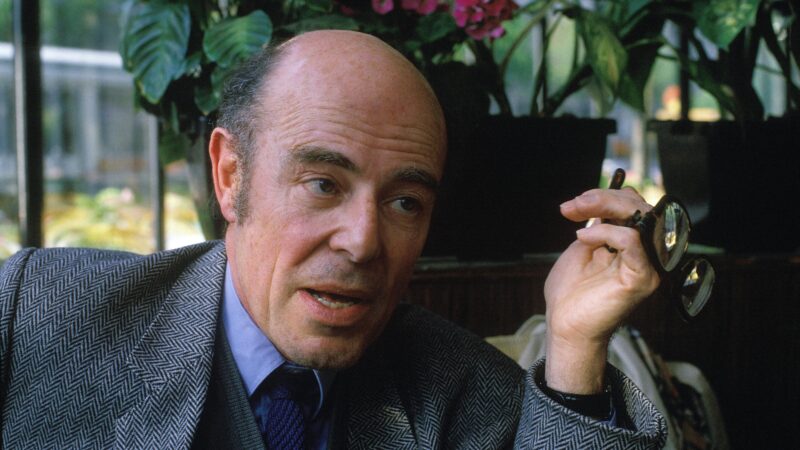Marcel Ophuls, who chronicled 20th century conflict and atrocities, dies at 97
Filmmaker Marcel Ophuls has died at the age of 97. Recognized as one of the great documentarians of his era, he died on Saturday, as confirmed in a post by the European Film and Audiovisual Institute.
Ophuls demanded — and commanded — his audience’s attention, in 4 plus hour documentaries like The Sorrow and The Pity and Hôtel Terminus.
Ophuls knew that by creating hours-long documentaries, he ran the danger of “not only seeming pretentious, but being pretentious.” But, as he told NPR in 1978, “there’s a relationship between attention span and morality. I think that, if you shorten people’s attention span a great deal, you are left with only the attraction of power.”
Ophuls was born in Germany and his family fled to France to escape the Nazis. They eventually ended up in Hollywood, where his father, the famed director Max Ophuls, found work. His son started out making fiction films, too, but went on to become one of the foremost chroniclers of the atrocities of the 20th century.
The Sorrow and The Pity is Ophuls’ 1969 epic about the Nazi occupation of France. He interviewed former Nazis, French officials who collaborated, members of the Resistance, and average people who simply found ways to get by. Throughout the film, Ophuls appears on camera—patiently drawing confessions from his subjects. The film faced criticism in France for its depiction of the country’s war efforts.
The Sorrow and The Pity became an art house hit, says Patricia Aufderheide, who teaches communications at American University in Washington, D.C. — and it helped create a new kind of documentary.
“It’s a kind of filmmaking where the filmmaker is very present as an investigator into something about the human condition,” she says.
Ophuls told NPR in 1992 that documentaries function as an antidote to news. Subjectivity is key, he said; the goal is “to juxtapose events and people in such a way that individual destinies and collective destinies make us think and reflect about our own roles in life.”
Ophuls was good at putting old Nazis and retired U.S. intelligence workers at their ease, as he does in his 1988 film Hôtel Terminus, about Klaus Barbie — a notorious Nazi — and the Americans who later protected him. When the film crew arrived to set up for interviews, Ophuls stayed in the back of the room, letting the crew chat up the subject.
Judy Karp, the filmmaker’s U.S. sound recordist, says Ophuls would adapt to make the interviewee comfortable. “He would come in as the person that he needed to be in order to get the story out of them and to get the information that he wanted,” Karp says. “He was never false — but it’s like we never knew which Marcel was going to be there.”
For Hôtel Terminus, which won the best documentary feature Oscar in 1988, Ophuls interviewed French writer and philosopher René Tavernier, who lived through the period the film covers. His son, acclaimed director Bertrand Tavernier, described Ophuls as one of the greatest of all filmmakers, not just documentarians.
“He knew that documentary sometimes has to be built as a fiction film,” Tavernier told NPR in an interview before his own passing in 2021. “You have to have interesting characters. You have to have an interesting angle. You have to work on dramatization, progression. At the same time, he was never manipulating the audience.”
His stories were true, but Ophuls thought of himself as an entertainer nonetheless. In 1978, he told NPR that his greatest hero in show business — and yes, he considered himself in show business — was Fred Astaire. The dancer’s “control and structure and balance is so dignified, and so rarified,” he said.
In 1992, he told NPR that his mission was to make the world a better place through his work, going beyond entertainment. “That’s what we live for, isn’t it?” he said. “To try to make it better.”
Shootings at school and home in British Columbia, Canada, leave 10 dead
A shooting at a school in British Columbia left seven people dead, while two more were found dead at a nearby home, authorities said. A woman who police believe to be the shooter also was killed.
Trump’s EPA plans to end a key climate pollution regulation
The Environmental Protection Agency is eliminating a Clean Air Act finding from 2009 that is the basis for much of the federal government's actions to rein in climate change.
The U.S. claims China is conducting secret nuclear tests. Here’s what that means
The allegations were leveled by U.S. officials late last week. Arms control experts worry that norms against nuclear testing are unraveling.
From gifting a hat to tossing them onto the rink, a history of hat tricks in sports
Hat tricks have a rich history in hockey, but it didn't start there. For NPR's Word of the Week, we trace the term's some 150-year-history and why it's particularly special on the hockey rink.
Pam Bondi to face questions from House lawmakers about her helm of the DOJ
The attorney general's appearance before the House Judiciary Committee comes one year into her tenure, a period marked by a striking departure from traditions and norms at the Justice Department.
Ukrainian sled racer says he will wear helmet honoring slain soldiers despite Olympic ban
Vladyslav Heraskevych, a skeleton sled racer, says he will wear a helmet showing images of Ukrainian athletes killed defending his country against Russia's full-scale invasion. International Olympic Committee officials say the move would violate rules designed to keep politics out of the Olympics.








